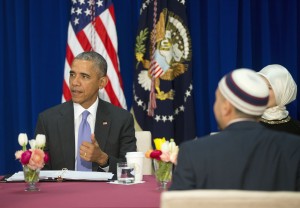
President Barack Obama is meeting with Muslim-American leaders from around the country as he pays his first visit to a mosque in the United States.
The White House says Obama plans to argue during the visit that the U.S. will more successfully confront extremism if it works with the Muslim community instead of viewing Muslims as potential enemies.
The participants in the meeting include university chaplains, community activists and public health professionals.
One of the participants, Ibtihaj Muhammad, has qualified for a spot on the United States Olympic Team for the Rio de Janeiro 2016 Olympic Games. She will make history as the first United States Olympian to compete in a hijab.
President Barack Obama paid his first visit to a U.S. mosque on Wednesday, working to confront bias that Muslim-Americans say is increasing at an alarming rate amid public concerns about terrorism and extremism.
Obama arrived late morning at the Islamic Society of Baltimore, where the campus contains a mosque and school that runs from kindergarten through 12th grade.
Last week, Obama became the first sitting president to speak at the Israeli Embassy. In remarks at the embassy, he warned of growing anti-Semitism in the world.
Obama’s message at the mosque will follow a similar tack. The White House said he will focus on the need to speak out against bigotry and reject indifference. It’s the kind of effort that Muslim-Americans said they’ve been waiting for from America’s political and religious leaders.
“For some time, we’ve been asking for pushback. Perhaps this will start a trend,” said Ibrahim Hooper, a spokesman for the Council on American-Islamic Relations.
CAIR has tracked a growing number of attacks on mosques and on individuals in the months following the Paris terrorist attack and the shooting rampage in San Bernardino, California. A severed pig’s head was delivered to a mosque’s doorstep in Philadelphia. Someone attempted to set fire to a mosque in Southern California.
Hooper said harassment and bullying is also on the rise. He cited Republican presidential candidate Donald Trump’s call for a ban on Muslims entering the country as an example of how bias toward Muslims has become part of the American mainstream.
“I don’t think there’s ever been this level of fear and apprehension in the Muslim-American community,” Hooper said.
For Obama, the visit in his final year in office reflects a willingness to wade into touchy social issues that often eluded him earlier in his presidency. For years, Obama has fought unrelenting but incorrect claims that he’s actually a Muslim and was born in Kenya, beliefs that polls suggest remain prevalent among many Republicans to this day. Obama, a Christian, was born in Hawaii.
With no plans for Obama to ever again appear on a ballot, Obama faces less pressure to avoid political controversy. Ahead of his visit Wednesday, White House officials readily acknowledged the visit could spark controversy but suggested that would help make his point about ignorance and religious bias. White House press secretary Josh Earnest predicted Obama’s visit would “prompt exactly the kind of discussion and debate that the president thinks is worth having.”
Nearly half of Americans think at least some U.S. Muslims are anti-American, according to a new Pew Research Center poll released Wednesday. Two-thirds of Americans said people, not religious teachings, are to blame when violence is committed in the name of faith. However, when respondents were asked which religion they consider troubling, Islam was the most common answer.
Meanwhile, some Republicans have criticized Obama for not linking attacks like the one in Paris to “radical Islamic terrorism.” Republican presidential candidates Ted Cruz and Trump have voiced that concern.
Obama has said he refuses to describe the Islamic State and other such groups that way because the term grants them a religious legitimacy they don’t deserve.
In June 2009, just five months into his presidency, Obama toured the Sultan Hassan mosque during a visit to Cairo. In a speech at Cairo University, he declared that the U.S. would never be at war with Islam. “America and Islam are not exclusive,” he said, and share “common principles of justice and progress, tolerance and the dignity of all human beings.”
Attendees at the Baltimore mosque are predominantly of Turkish heritage, although immigrants of other nationalities also participate, said Akbar Ahmed, an Islamic studies specialist at American University who has researched mosques around the U.S.
Obama left it to the last minute to visit a U.S. mosque, Ahmed noted, “but better late than never.”




